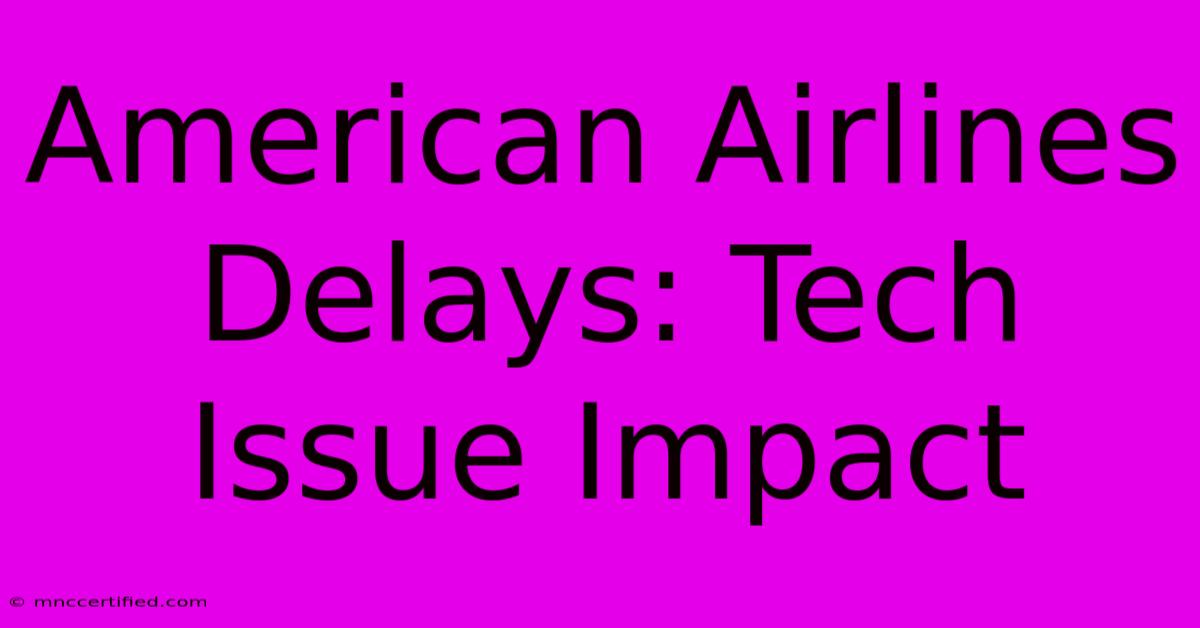American Airlines Delays: Tech Issue Impact

Table of Contents
American Airlines Delays: Tech Issue Impact
American Airlines, one of the world's largest airlines, recently experienced a significant technological outage that caused widespread flight delays and cancellations. This article delves into the specifics of the tech issue, its impact on passengers, the airline's response, and the broader implications for air travel. We'll explore how this situation highlights the critical role technology plays in the modern airline industry and the potential consequences when systems fail.
The Scope of the American Airlines Tech Issue
The recent American Airlines tech issue wasn't a minor glitch; it was a significant system failure affecting ground operations, flight scheduling, and communication across the airline's network. While the exact nature of the problem remains somewhat unclear, reports suggest a widespread system outage impacting crucial internal tools relied upon by airline staff. This wasn't a localized issue affecting a single airport; it cascaded across the entire American Airlines operation, resulting in:
- Widespread Flight Delays: Hundreds of flights were significantly delayed, leaving passengers stranded at airports and impacting travel plans across the country and internationally.
- Flight Cancellations: Some flights were completely canceled, forcing passengers to rebook and adjust their itineraries, often incurring additional expenses.
- Communication Breakdown: The tech failure hindered communication between airline staff, passengers, and airports, leading to confusion and frustration among travelers.
The Ripple Effect: Impact Beyond Passengers
The American Airlines tech issue didn't just affect passengers directly experiencing flight delays. The ripple effect was substantial:
- Economic Impact: Delays and cancellations led to significant financial losses for the airline, including costs associated with rebooking passengers, providing compensation, and dealing with customer service inquiries. The broader economic impact extends to connected industries like tourism and hospitality.
- Reputational Damage: A major technological failure like this can severely damage an airline's reputation, impacting customer loyalty and future bookings. Trust is paramount in the airline industry, and this event will likely influence how travelers view American Airlines in the future.
- Safety Concerns (indirect): While the tech issue itself didn't directly compromise flight safety, the resulting chaos and rushed schedules could indirectly increase the risk of operational errors. The pressure on staff to catch up can lead to human error.
American Airlines' Response and Recovery
American Airlines responded to the situation by:
- Issuing Public Statements: The airline released statements acknowledging the tech issue and apologizing for the inconvenience caused to passengers.
- Providing Customer Support: The airline worked to rebook passengers on alternative flights and offered compensation where appropriate. This included hotel accommodations and meal vouchers for those stranded.
- Investigating the Root Cause: A thorough investigation is underway to determine the exact cause of the technological failure and implement measures to prevent similar incidents in the future.
Lessons Learned and Future Preparedness
This incident serves as a stark reminder of the critical dependence of the airline industry on reliable technology. American Airlines, and other airlines globally, must:
- Invest in Robust IT Infrastructure: Redundant systems, enhanced cybersecurity, and regular maintenance are essential to prevent future outages.
- Improve Contingency Planning: Airlines need comprehensive contingency plans to mitigate the impact of technological failures, including efficient communication protocols and alternative operational strategies.
- Enhance Communication with Passengers: Clear, timely, and consistent communication during disruptions is crucial for managing passenger expectations and reducing frustration.
Conclusion: Navigating the Digital Landscape of Air Travel
The American Airlines tech issue underscores the interconnectedness of technology and air travel in the 21st century. While technological advancements offer significant benefits, they also present challenges that require careful planning, robust infrastructure, and a proactive approach to risk management. The airline's response, both immediate and long-term, will be crucial in shaping its reputation and regaining passenger trust. The industry as a whole must learn from this incident to enhance resilience against future disruptions. This event will undoubtedly influence future investment in airline technology and operational strategies, emphasizing a focus on reliable, redundant systems to avoid similar widespread disruptions in the future.

Thank you for visiting our website wich cover about American Airlines Delays: Tech Issue Impact. We hope the information provided has been useful to you. Feel free to contact us if you have any questions or need further assistance. See you next time and dont miss to bookmark.
Featured Posts
-
Pacers Spoil Warriors Holiday
Dec 25, 2024
-
White Christmas Forecast This Year
Dec 25, 2024
-
Home Alone Christmas Tv Schedule
Dec 25, 2024
-
Olympic Snowboarder Sophie Hediger Passes
Dec 25, 2024
-
Eiffel Tower Evacuation Elevator Fire Report
Dec 25, 2024